| Srl | Item |
| 1 |
ID:
101491
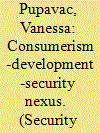

|
|
|
|
|
| Publication |
2010.
|
| Summary/Abstract |
Critics of global governance have been influenced by Foucault's analysis of modern total institutions disciplining both the mind and the body. However, Foucauldian biopolitics may present global governance too smoothly. This article takes critiques arguing that consumer capitalism's divorce from industrial production encourages romantic understandings of global problems and applies them to development aspects of the development-security nexus. It discusses three influential economists each of whose work is emblematic of consumer capitalism's international development vision at particular historical junctures. The article outlines how Rostow's The Stages of Economic Growth, arising during the postwar economic growth boom, envisages developing countries becoming consumer societies at the highest stage of development, but also anticipates consumer society's romantic critiques of modernity. It next examines Schumacher's Small Is Beautiful and his Buddhist economics, arising in the post-Bretton Woods crisis period, as symptomatic of re-emerging romantic critiques of society. Finally, it discusses Sen's human development approach as a market romance illustrating consumer capitalism's individual-orientated development strategies. The article concludes that the contemporary development romance addresses neither people's basic needs nor their aspirations, and it problematizes global governance's ability to secure and govern populations.
|
|
|
|
|
|
|
|
|
|
|
|
|
|
|
|
| 2 |
ID:
062350
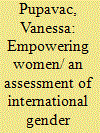

|
|
|
| 3 |
ID:
064773
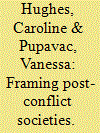

|
|
|
| 4 |
ID:
081373
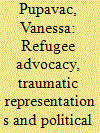

|
|
|
|
|
| Publication |
2008.
|
| Summary/Abstract |
Most studies of how refugees are represented focus on negative media representations. Less attention has been paid to sympathetic counter-representations. This article explores the representations preferred by refugee advocacy organizations and how they tend to exclude the mass of ordinary refugees and the difficult arguments required to defend refugee rights. The article outlines the rise of the health paradigm for understanding the conditions of refugees. The contemporary representation of refugees as traumatized victims is inspired by compassion. However, the trauma framework implies impaired capacity and the need for individuals to surrender their welfare to expert authorities. The article argues that casting refugees in the sick role risks compromising their rights. The article is informed by the writing of the sociologist Talcott Parsons on the sick role and the philosopher Hannah Arendt on refugees
|
|
|
|
|
|
|
|
|
|
|
|
|
|
|
|
| 5 |
ID:
114566
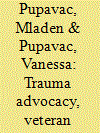

|
|
|
|
|
| Publication |
2012.
|
| Summary/Abstract |
This article considers international trauma advocacy and Croatian veteran politics. The article begins by discussing international trauma advocacy and therapeutic state legitimation. International trauma advocacy seeks to promote peace, however unwittingly it has legitimized veteran politics antithetical to its ideals. The second half of the article goes on to consider Croatian state legitimation and privileged veteran pensions. The article suggests that Croatia is developing therapeutic forms of state legitimation. The article highlights the problems of Croatia as a therapeutic state and its recognition of extensive veteran privileges. The article concludes that the veteran privileges represent a political, social, and economic burden which is hindering Croatia's postconflict development.
|
|
|
|
|
|
|
|
|
|
|
|
|
|
|
|